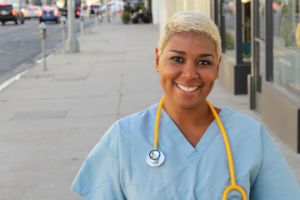
Covid Vaccines and Nurse Safety
It has been a challenge for nurses to stay safe during the COVID-19 pandemic, but nurses are safer after getting the COVID vaccine! Most states wisely included nurses and other front-line medical professionals in their first waves of Covid-vaccines, knowing they were among the most in danger and at-risk.
After all, more than 3,000 healthcare workers were confirmed to have died from Covid by December 2020. But worry remains, from rumors about side effects to concerns about how long the vaccine will protect nurses since the pandemic seems a long way from being completely suppressed.
How Effective is the COVID-19 Vaccine?
The question of how effective the COVID-19 vaccine is is a reasonable one to ask. The vaccines on the market had a brief testing period, and not enough time has passed to find out how effective the vaccine is. Even the CDC admits that a significant amount is not known about how well the vaccine is working and preventing the spread of the coronavirus.
However, a study from the Sheba Medical Centre in Israel found that a single dose of the Pfizer vaccine is up to 85% effective. The positive rate of infection among staff showed an almost 50% drop two weeks after the first dose, and the infection rate halved again in the 15 to 28-day period after the first dose. Early COVID vaccine effectiveness data shows that the vaccination works as it should.
Are Vaccines Recommended for Nurses?
The CDC recommends the COVID vaccine for nurses because they are in a position to spread the virus amongst the hospital staff and patients. The vaccine has been shown to reduce the spread among patients and unvaccinated staff. The variants of COVID-19 are indeed beginning to show up at an alarming rate, but the current vaccines do have some efficacy against the variants. Healthcare staff who get vaccinated with either Pfizer or AstraZeneca vaccines can be confident that their risk of infection is low, as is their ability to spread the virus further.
How Long Does the COVID Vaccine Last?
As it currently stands, no one in the healthcare science field can state how long the vaccine is effective with any certainty. The vaccine is too new, and not enough time has passed to determine its long-term efficacy. Therefore, nurses are highly advised to take advantage of a vaccine offering as soon as they are notified to help build their immunity and add to herd immunity.
How Can Nurses Stay Safe Even After a Vaccine?
It has been a challenge for nurses to stay safe during the initial outbreak and subsequent virus surges. Nursing home staff were the primary source of the spread of COVID-19 in long-term healthcare facilities due to their mobile nature. In addition, many employees in the long-term healthcare industry tend to hold down positions in more than one facility. In turn, the nursing staff unwittingly spread the coronavirus from facility to facility as they moved around their jobs.
Nurses in hospitals faced a similar issue of unknowingly becoming virus spreaders, although their spread was more limited due to their working at a single facility. Nevertheless, transmission is still an ongoing issue and mirrors the hospital-based spread of MRSA and C. diff. The implication for nursing staff is that they still have to wear PPE while treating patients even after getting vaccinated.
The initial dose of the vaccine takes at least two weeks to take full effect. Nurses still have to wear masks and PPE garments to protect themselves and others against infection and should wear a mask whenever they’re out in public on their own time. The same is true even after the second dose. The fact is, there is still a lot that science does not know about the coronavirus, variants are starting to show up and may be more potent than the original COVID-19 virus, and a nurse can never be too careful with their healthcare.
What Does the Future of Nursing Look Like After COVID-19 Vaccinations?
Nurses can expect to be wearing PPE during their shifts for the foreseeable future. It may be years before we can control the virus to a point where the risk of transmission is low or nonexistent. Mask-wearing is most likely to become a norm instead of an exception in many healthcare settings. They have been shown to be highly effective in minimizing coronavirus transmission and many other airborne viruses and bacteria. The healthcare industry has always used PPE to an extent, but only in extreme settings or necessary. The use of full-body PPE may adapt over time, and healthcare professionals wind up using more minor, but nurses can expect to use masks and gloves even after the COVID-19 emergency has passed.
What is known is that the COVID-19 pandemic has created changes in the healthcare industry that may become the new norm. What is unknown is which changes are here to stay and which ones will disappear due to impracticality or their relation to the needs of the pandemic. The role of a nurse will always be one of providing care to patients in need, but it may be done differently in the years to come.
Related:






